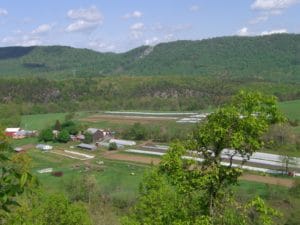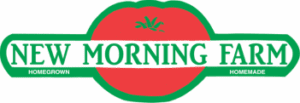[This article was previously published in the summer issue of The Cultivator, Cornucopia’s quarterly newsletter.]
by Rachel Zegerius,
Communications and Development Associate at The Cornucopia Institute
 |
A warm spring morning finds Pennsylvania organic farmer Jim Crawford where any farmer might be this time of year….on a bicycle trek in Germany? Over 4,000 miles from his fields, Jim is touring the historic streets of Berlin, while apprentices zealously plant and prepare soil for what hopes to be another productive year at Crawford’s 95-acre New Morning Farm.
It begs the question: How can a successful, life-long farmer evade the impulse to farm during the outset of the growing season? Not by accident. Intentional and strategic, Crawford is striving to implement a well-thought-out legacy plan.
He explains, “We’re always thinking about the future of what we do.” With this trip he is leaning into retirement, reaping the harvest of many years practicing patience and communication, cultivating a foundation of trust in his successors.
“If we can retire, we’ve created something truly sustainable,” says Crawford. And, after 40 years of growing more than 60 different certified organic crops (vegetables, berries, and herbs) and training hundreds of future farmers, the Crawfords have done just that.
Together with his wife Moie, Jim has focused endless energy actualizing agricultural innovations and, perhaps more importantly, tending the relationships necessary to sustain them. “My retirement is tied to my success at managing people; getting, finding, and keeping a good crew,” says Crawford.
He explains that this formula for success hinges on cooperation, imparting a sense of responsibility and partnership to his apprentices, more than 200 of whom have come through the farm over the years.
Collaboration and participatory problem solving have been tenets of New Morning Farm since its inception in 1976. “We knew at the very beginning that we were bucking the trends of the agricultural economy,” says Crawford. Early on, in 1988, the Crawfords mapped their role in the market-place to include their loyalty to collaboration. In response to a common problem, balancing supply and demand, three neighboring farm families initiated the now hugely successful, farmer-owned Tuscarora Organic Growers Cooperative (TOGC).
The vision was a strategy to capture economies of scale — the classic reason for the formation of co-ops — and to overcome the barriers erected by a corporate-driven system, in this case, big agriculture.
What started with five or six growers is now stronger than ever with 50 grower-owners. TOGC serves the function of coordinating production, distribution, and marketing. Aggregating products creates efficiency for both organic farmers and their institutional buyers, mostly in the greater Washington, D.C. region.
“The co-op helps small-scale people make a living in a market that does not favor them, but puts them at a disadvantage,” explains Crawford. “If we weren’t a cooperative, we would have had a hell of a lot harder time. We are a center of organic vegetable production in the region because of the existence of the co-op.”
The model of combining food aggregation and distribution services to strengthen farmer capacity and supply markets has been gaining popularity in recent years as the food hub movement. But, while food hubs have potential to build stronger regional food systems, many could benefit from the co-op model that TOCG provides.
Crawford explains, “Many food hubs are cooperatives in spirit, but do not implement all of the structures. When growers cooperate as owners, they become highly committed to the process. The psychology is better, resulting in better quality of product and better service to customers.”
 For decades now, New Morning Farm’s happy customers have flocked to weekend markets. Through the years there is no question that the Crawfords have been a powerful force behind the good food movement.
For decades now, New Morning Farm’s happy customers have flocked to weekend markets. Through the years there is no question that the Crawfords have been a powerful force behind the good food movement.
When asked what he has held onto throughout the years as a reason for being a grower, Crawford answers, “Among the many reasons, you are producing something that has intrinsic value, you know its high quality because it’s certified organic. And, you are always learning. This type of diversified farming is intellectually challenging. Working with nature, you always have the potential to do it better.”

